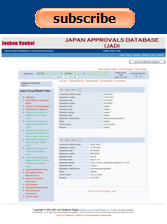Sense of Life Worth Living (Ikigai) and Mortality in Japan
Sendai - Team led by Dr. I. Tsuji from the Division of Epidemiology, Department of Public Health & Forensic Medicine, Tohoku University Graduate School of Medicine, found in the Ohsaki Cohort Study published in "Psychosomatic Medicine" journal August 2008 issue that lack of "something to live for" (ikigai in Japanese) shortens life expectation.
Tohoku University Graduate School of Medicine, found in the Ohsaki Cohort Study published in "Psychosomatic Medicine" journal August 2008 issue that lack of "something to live for" (ikigai in Japanese) shortens life expectation.
Ohsaki National Health Insurance Cohort Study: "From September to December 1994, all National Health Insurance beneficiaries, aged from 40 to 79 years, who live in 1 city and 13 towns in the catchment area of Ohsaki Public Health Center, Miyagi Prefecture were subjects of a questionnaire survey regarding health-related lifestyle. We received effective responses from 52,029 individuals (94.6%). After that, we traced medical care utilization and its costs in addition to death and cancer incidence. By this, in addition to conventional epidemiological research aimed at identification of risk factors, we investigate the impact of lifestyle upon medical costs. The two studies above, if combined, become a cohort study on a 100,000 person scale investigating the relation between health-related lifestyles and cancer incidence. No other single institute or university department in Japan maintains such a large-scale cohort study".
Source: Psychosomatic Medicine 70:709-715 (2008)
© 2008 American Psychosomatic Society
ORIGINAL ARTICLES |
Sense of Life Worth Living (Ikigai) and Mortality in Japan: Ohsaki Study
From the Division of Epidemiology, Department of Public Health and Forensic Medicine, Tohoku University Graduate School of Medicine, Sendai, Japan.
Objective: To investigate the association between the sense of "life worth living (ikigai)" and the cause-specific mortality risk. The psychological factors play important roles in morbidity and mortality risks. However, the association between the negative psychological factors and the risk of mortality is inconclusive.
Methods: The Ohsaki Study, a prospective cohort study, was initiated on 43,391 Japanese adults. To assess if the subjects found a sense of ikigai, they were asked the question, "Do you have ikigai in your life?" We used Cox regression analysis to calculate the hazard ratio of the all-cause and cause-specific mortality according to the sense of ikigai categories.
Results: Over 7 years’ follow-up, 3048 of the subjects died. The risk of all-cause mortality was significantly higher among the subjects who did not find a sense of ikigai as compared with that in the subjects who found a sense of ikigai; the multivariate adjusted hazard ratio (95% confidence interval) was 1.5 (1.3–1.7). As for the cause-specific mortality, subjects who did not find a sense of ikigai were significantly associated with an increased risk of cardiovascular disease (1.6; 1.3–2.0) and external cause mortality (1.9; 1.1–3.3), but not of the cancer mortality (1.3; 1.0–1.6).
Conclusions: In this prospective cohort study, subjects who did not find a sense of ikigai were associated with an increased risk of all-cause mortality. The increase in mortality risk was attributable to cardiovascular disease and external causes, but not cancer.
Abbreviations: CVD = cardiovascular disease; NHI = National Health Insurance; PHC = Public Health Center; IHD = ischemic heart disease; HR = hazard ratio; CI = confidence interval; BMI = body mass index.
For information concerning mental disorders in Japan see also
Epidemiology consulting and data.
